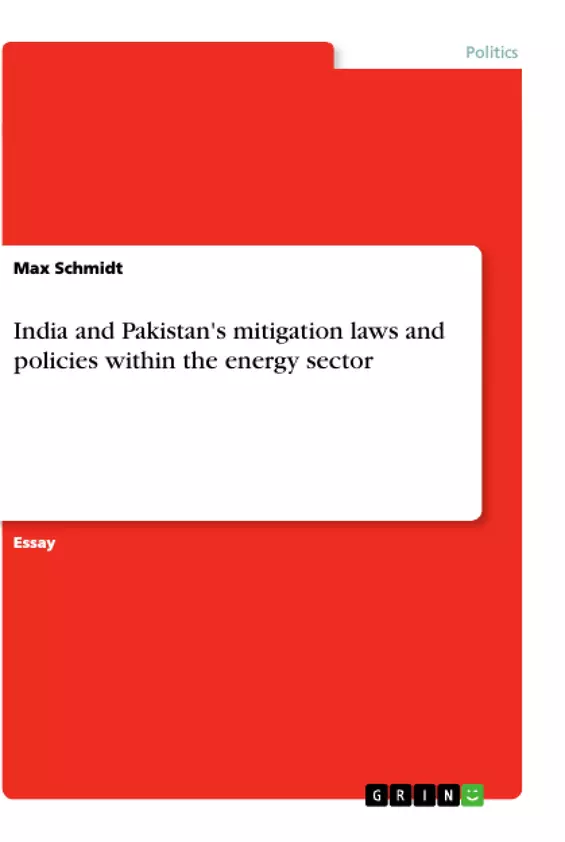This essay will compare and contrast India and Pakistan’s climate change laws and policies of approximately the last decade regarding three kinds of targets that are attributed high weight in their Intended Nationally Determined Contributions: Greenhouse gas emission reduction, emission intensity and efficiency as well as renewable energy (RE).
This focus on mitigation efforts rather than adaptation efforts has been chosen since emerging economies are predicted to be “by far the most important source of future emission growth”. Linked to this, the two states’ main sources of emissions – their electricity and energy sectors – will be discussed throughout the essay. Overall, it is argued that despite similar starting points, India’s emission-related policies have grown more ambitious in recent years, compared to those of Pakistan – but both countries’ efforts still fall short of combatting climate change sufficiently.
Inhaltsverzeichnis (Table of Contents)
- India and Pakistan within the global climate governance regime
- Emission reduction targets
- Emission intensity and efficiency targets
- Renewable energy targets
Zielsetzung und Themenschwerpunkte (Objectives and Key Themes)
This essay critically compares and contrasts the laws and policies of India and Pakistan to tackle climate change, focusing on their intended nationally determined contributions (INDCs). The essay examines the two countries' efforts in three key areas: greenhouse gas emission reduction, emission intensity and efficiency, and renewable energy.
- The essay analyzes the ambitions and approaches of India and Pakistan to address climate change.
- It explores the different types of targets set by both countries, focusing on mitigation rather than adaptation.
- The essay highlights the influence of factors like historical emissions, economic development, and international support on policy decisions.
- It examines the challenges and shortcomings of both countries' efforts in tackling climate change.
- The essay compares and contrasts the effectiveness of the respective policies and their contribution to global climate governance.
Zusammenfassung der Kapitel (Chapter Summaries)
- The first chapter discusses the context of climate change in India and Pakistan, outlining their vulnerability, commonalities, and differences in tackling the issue. It introduces the focus on mitigation efforts and the significance of the electricity and energy sectors.
- The second chapter explores the role of both countries within the global climate governance regime, analyzing the INDCs submitted before COP 21 and their commitments under the Paris Agreement. It also delves into the principle of common but differentiated responsibilities and the conditional nature of the targets.
- The third chapter examines the emission reduction targets set by India and Pakistan, highlighting the absence of direct targets in India's INDC and analyzing Pakistan's target in terms of conditionality and the lack of a reference year. It discusses the shortcomings of the targets and explores their implications for future emission reductions.
- The fourth chapter analyzes the emission intensity and efficiency targets of both countries, comparing their approaches and evaluating their effectiveness. It examines the role of policy instruments, such as carbon pricing and renewable energy subsidies, in achieving these targets.
- The fifth chapter focuses on the renewable energy targets of India and Pakistan, comparing their ambitions and exploring the challenges they face in achieving them. It discusses the importance of policy support, technology transfer, and investment in realizing their renewable energy goals.
Schlüsselwörter (Keywords)
This essay centers around the core concepts of climate change law and policy in the context of two developing countries, India and Pakistan. It examines their INDCs, focusing on emission reduction, emission intensity and efficiency, and renewable energy targets. Key terms include climate vulnerability, greenhouse gas emissions, mitigation efforts, intended nationally determined contributions (INDCs), common but differentiated responsibilities, international support, and renewable energy.
Frequently Asked Questions
How do India and Pakistan compare in their climate change policies?
While both started from similar points, India's policies have become more ambitious recently. However, both countries' efforts are still considered insufficient to fully combat climate change.
What are INDCs in the context of the Paris Agreement?
INDCs stand for Intended Nationally Determined Contributions, which are the primary climate action plans submitted by countries to outline their targets for emission reductions.
What are the three main focus areas of the mitigation efforts?
The essay focuses on greenhouse gas emission reduction, emission intensity and efficiency, and renewable energy (RE) targets.
Why is the energy sector critical for these countries?
The electricity and energy sectors are the main sources of emissions in both India and Pakistan, making them the primary targets for mitigation policies.
What is the principle of "common but differentiated responsibilities"?
It is a principle in global climate governance acknowledging that while all nations are responsible for addressing climate change, developed nations bear a greater historical burden and have more resources than emerging economies.
- Citar trabajo
- Max Schmidt (Autor), 2020, India and Pakistan's mitigation laws and policies within the energy sector, Múnich, GRIN Verlag, https://www.grin.com/document/978878



